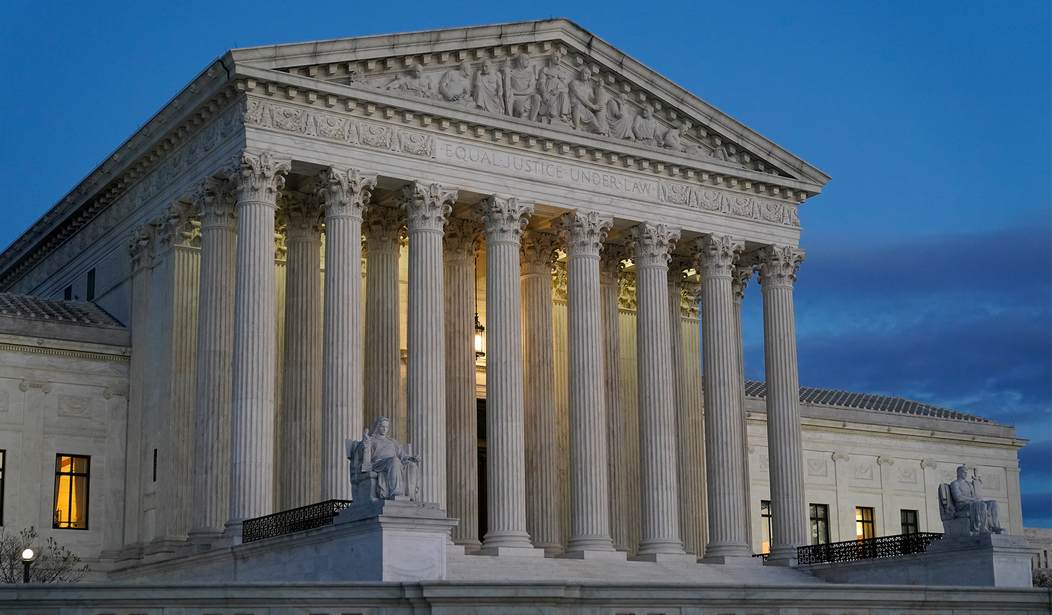The Supreme Court of the United States issued a statement on Thursday concerning its investigation into the unprecedented leak of a draft opinion in the Dobbs case last year that set off weeks of protests and illegal harassment of justices at their homes.
Don't get too excited though, because the 23-page Supreme Court statement and public version of the investigation report is...inconclusive.
The Court's report reiterates that the May 2022 leak of the draft Dobbs opinion was "one of the worst breaches of trust in its history" and "no mere misguided attempt at protest" but "a grave assault on the judicial process."
As Townhall reported in the wake of the stunning leak, Chief Justice John Roberts tasked the Marshal of the Supreme Court and her staff with investigating the leak and discerning who and how the draft opinion ended up published by Politico.
"After months of diligent analysis of forensic evidence and interviews of almost 100 employees, the Marshal’s team determined that no further investigation was warranted," the Supreme Court's statement continued. "In following up on all available leads, however, the Marshal's team performed additional forensic analysis and conducted multiple follow-up interviews of certain employees. But the team has to date been unable to identify a person responsible by a preponderance of the evidence," SCOTUS explained.
The unsatisfying conclusion from the Marshal's investigation seems to be something of the result of a dead-end in the search for a leaker or leakers. As the Court added, it consulted with former Homeland Security Secretary Michael Chertoff to assess the Marshal's investigation. Chertoff called the investigation "thorough" and said he "cannot identify any additional useful investigative measures" that hasn't already been used.
Recommended
Some notable findings contained in the Marshal's report — embedded in full below — released on Thursday include:
- it is unlikely that the Court’s information technology (IT) systems were improperly accessed by a person outside the Court
- 126 interviews of 97 employees were conducted, all of whom denied disclosing the opinion
- A few of those interviewed admitted to telling their spouses about the draft opinion or vote count in violation of the Court’s confidentiality rules
- a preponderance of evidence did not reveal how the draft opinion was provided to Politico
- certain employees emailed the draft opinion to other employees, with approval but there was no evidence discovered that anyone emailed the draft opinion to anyone else, although technical limitations in the
- SCOTUS' computer record keeping at the time made it impossible to rule out this possibility entirely
- 82 Supreme Court employees had access to electronic or hard copies of the draft opinion
- several personnel acknowledged that they did not treat information relating to the draft opinion consistent with the Court’s confidentiality policies
- investigators did not find any logs or IT artifacts indicating that the draft opinion was downloaded to removable media, but it is impossible to rule out
- investigators found no relevant information from Court-issued laptops and mobile devices
- employees who were requested to do so voluntarily provided call and text detail records and billing statements for their personal devices for a defined period to the best of their abilities, but investigators found nothing relevant in the limited logs
- investigators looked closely into any connections between employees and reporters, especially any contacts with anyone associated with Politico, plus assessment of a wide array of public speculation, mostly on social media, about any individual who may have disclosed the document, but investigators found nothing to substantiate any of the social media allegations regarding the disclosure.
- investigators cannot eliminate the possibility that the draft opinion was inadvertently or negligently disclosed – for example, by being left in a public space either inside or outside the building
The Marshal's report noted that "if a Court employee disclosed the draft opinion, that person brazenly violated a system that was built fundamentally on trust with limited safeguards to regulate and constrain access to very sensitive information," and pointed to the COVID-19 pandemic as contributing to an "expansion of the ability to work from home, as well as gaps in the Court's security policies" that "created an environment where it was too easy to remove sensitive information from the building and the Court's IT networks."
As such, the Marshal's investigation "identified numerous Court policies and practices that should be improved" to prevent future leaks:
- too many personnel have access to certain Court-sensitive documents
- there is no universal written policy or guidance on the mechanics of handling and safeguarding draft opinions and Court-sensitive documents, and practices vary widely throughout the Court
- The Court’s current method of destroying Court-sensitive documentshas vulnerabilities that should be addressed
- The Court’s information security policies are outdated and need to beclarified and updated
- There are inadequate safeguards in place to track the printing andcopying of sensitive documents
- Many personnel appear not to have properly understood the Court’spolicies on confidentiality
The report also noted that bills were introduced in the last Congress "which would expressly prohibit the disclosure of the Supreme Court's non-public case-related information to anyone outside the Court" and "consideration should be given to supporting such legislation."
So, while there were plenty of vulnerabilities identified but no clear culprit to point to, the Supreme Court Marshal reported that investigators "continue to review and process some electronic data that has been collected and a few other inquiries remain pending" and pledged that "to the extent that additional investigation yields new evidence or leads," investigators will "pursue them."
Read the full SCOTUS report below:

























Join the conversation as a VIP Member